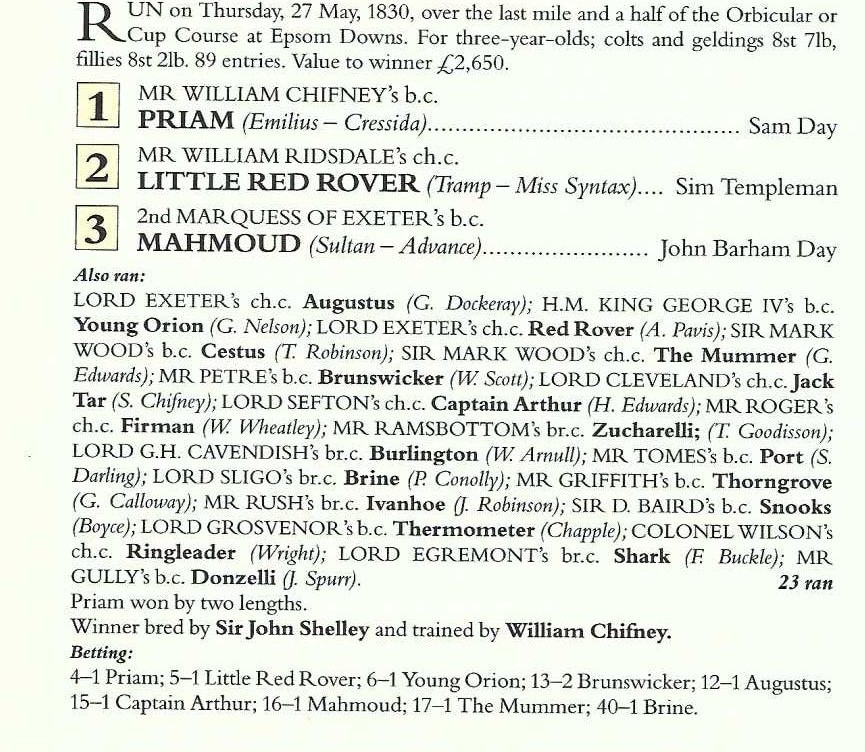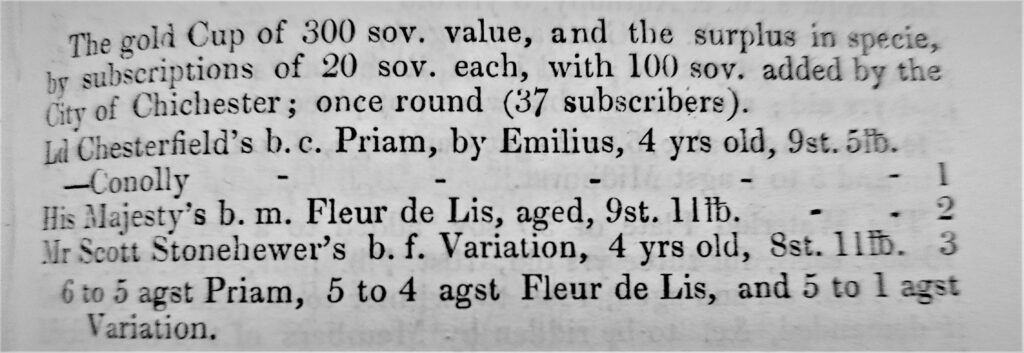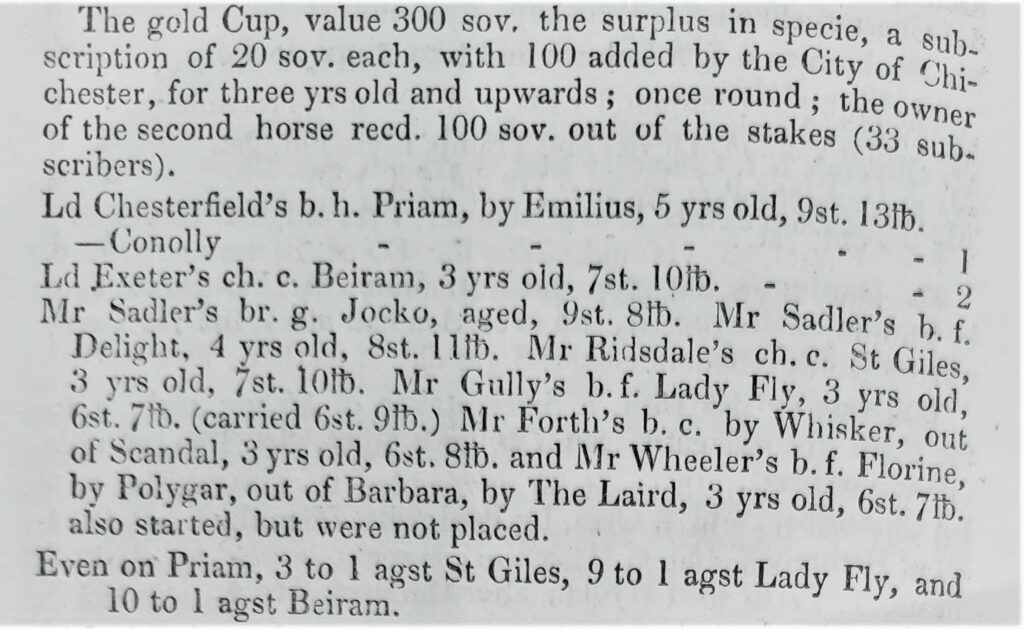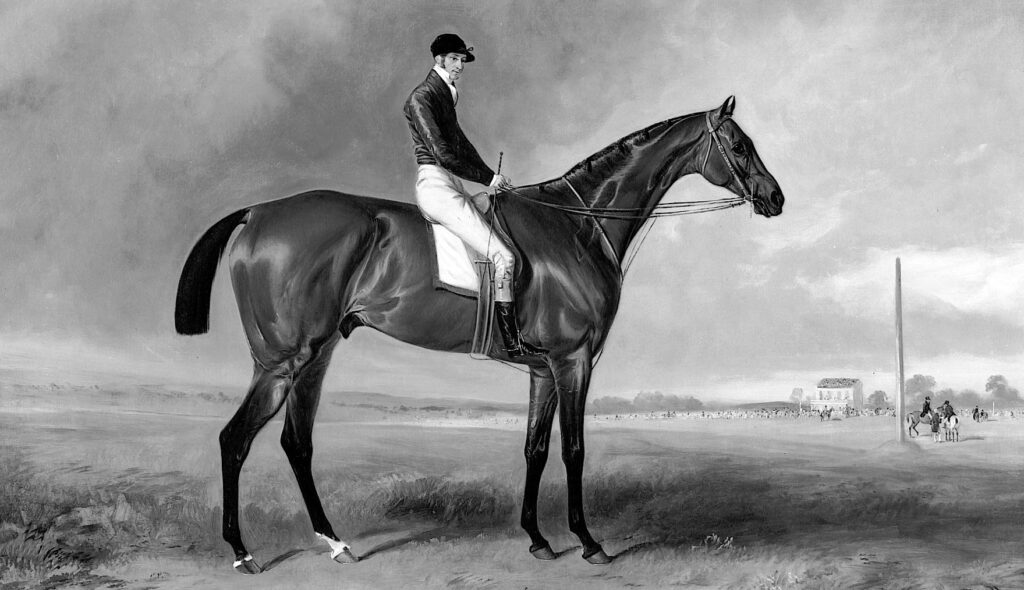Priam – the peer of Flying Childers and Eclipse
In 1830, Priam’s Derby victory not only surpassed all previous winners, but he became the yardstick to measure future champions.
Bred by Sir John Shelley, Priam was by Emilius (1823 Derby) out of the 20-year old mare, Cressida – a full sister to Eleanor (1801 Derby and Oaks). Sent as an unbroken yearling to be sold at the Newmarket July Meeting, Priam was bought by William Chifney for 1,000 guineas, then a record price for a yearling..
The Druid wrote of Priam: “In height, he was a trifle above 15.3, rather light-limbed, and with lightish back ribs, from which his critics drew their short-course inferences. His greatest merit lay in his forehand; he had deep oblique shoulders, and one of the most expressive and blood-like of heads.”
Making his debut at the Newmarket Craven Meeting on 12 April 1830, Priam, officially a two-year old (since at this time racehorses became a year older on May Day), won the Riddlesworth Stakes from Mahmoud. He then added the Column Stakes from the future Two Thousand Guineas winner Augustus. Frank Buckle, then 64, rode Priam in both races since neither contracted jockeys could make 8st 4lb. Days later, such was his early reputation that at Newmarket’s First Spring Meeting he received forfeit in two sweepstakes on the same afternoon.
Taking racehorses from Newmarket to Epsom during the first part of the 19th century was entirely different from today. So the details of Priam’s journey to Epsom for the Derby make interesting reading. On Friday, 14 May, Priam left Newmarket at 4 a.m. to walk the 21 miles to Newport. Next day, he walked a further 22 miles to the ‘Cock’ at Epping, and the day after, he continued through Piccadilly to Smith’s stables in Sloane Street. On the fourth day he travelled on to Mickleham in Surrey, so leaving his trainer, William Chifney, the required nine days needed to put him right for the great race. Due to previous jockey arrangements, however, Priam’s Derby mount went to the third choice of jockey, Sam Day. Nevertheless, William Chifney and his brother Sam backed Priam to win £10,000.
Priam went to Epsom as the 4-1 Derby favourite, however, after bouts of very heavy rain and at least a dozen false starts, when the flag finally fell, Priam was left rearing up at the back of the field. Nonetheless, approaching Tattenham Corner, Sam Day, having used some speed, settled Priam nicely, to move up in close attendance to the leaders. Continuing to the distance pole, Little Red Rover led Augustus and Mahmoud, but from there, Day allowed Priam his head and cruising past Little Red Rover, went on to win easily by two lengths.

At Ascot, Priam, when set to give Mahmoud and another Derby rival 7lb in a sweepstake over the Old Mile, he justified the odds of 1-3 and was then saved for the St Leger.
The 130 mile journey to Doncaster was broken after two days to put Priam through a series of searching gallops in Exton Park, Chester, before continuing the 85 miles on foot to Doncaster. This second part of the journey, however, was subjected to heavy rain, leaving parts of the course all but flooded. Then, on the day, as the field of 28 lined up for the Classic, a thunder and lightning storm broke over Town Moor. Inevitably, the conditions affected the form, and whilst the winner, Birmingham, a strapping 17.0 hands son of the St Leger winner Filho da Puta, relished the quagmire conditions, the lighter framed Priam struggled to challenge. Heroically, he closed the gap on Birmingham, but was beaten by half-a-length.
Priam recovered remarkably well and, two days later, beat Retriever in a match over one and a half miles, before walking over for the Gascoigne Stakes. To enhance Priam’s reputation, later that afternoon Retriever won the Doncaster Cup.
The following year at the Craven Meeting, Priam won the Craven Stakes and the two-mile Port Stakes, then after a failed attempt to run him in the Ascot Gold Cup, the Chifney’s sold him to Lord Chesterfield for 3,000 guineas. Priam was then matched to carry 7st 11lb, over two miles at Newmarket against the year older mare Lucetta (8st 8lb), winner of the previous Ascot Gold Cup and a Kings Plate only three days earlier, The match generated great interest with level betting – Sam Chifney on Priam and Jem Robinson on Lucetta. The mare, thought to be the better stayer set a strong pace, Chifney, however, kept Priam directly behind Luceta, until 150 yards out, when he not only cruised past, but went on to win by four lengths. This was an outstanding performance, confirming Priam’s reputation as one of the Turf’s great horses.
Priam then went on to win the Goodwood Cup in a canter.
Rested until late October, he won a 10 furlong Match ‘Across the Flat’, against the previous year’s Two Thousand Guineas winner, Augustus, conceding 16lbs and winning by three-quarters of a length.
Now five and reappearing at odds of 1-4 in Newmarket’s Craven Stakes, he ran an unexplained shocker to finish third of five behind Chapman.
In May, Priam beat Lucetta again in a 3½ mile King’s Plate and in June at Ascot, he won the Eclipse Foot, beating Sarpendon.
Returning for the Goodwood Cup on Wednesday, 15 August, and following Lucetta’s win in the Goodwood Stakes, Priam, although even-money, was set to give 31lb to that year’s Derby winner, St Giles, 46lb to the second in the Oaks, Lady Fly and 31lb to Beiram, a winner of four races at Newmarket and the Drawing-room Stakes at Goodwood the day before. And it was Beiram who severely tested Priam, the two in furious combat up the straight, with Priam courageously denying Beiram to win by a short-head.

Inevitably, the race took its toll of Priam and soon after, Lord Chesterfield retired him to his Bretby Park Stud, near Burton-on-Trent, at a fee of £30.
In 1835, after a residency of four years and at time when his two-year-olds were winning, Lord Chesterfield, deeply in debt, sold Priam to Richard Tattersall on behalf of Dr A.T. Merritt of Virginia, for 3,500 guineas to go to America.
In the ensuing years after Priam’s fillies (Miss Letty, Industry and Crucifix), had won the Oaks three times in four years, belated offers sent to America of 4,000 guineas and 5,000 guineas were refused.
Priam was Champion Sire in Britain in 1839 & 1840. Overall his fillies were better than his colts, with Crucifix (b.f. 1837), the best, winning both the 1,000 and 2,000 Guineas together with the Oaks, then going on to foal Surplice (b.c. 1845), by Touchstone, winner of the Derby and St Leger.
In North America, Priam was Champion Sire four times in five years 1942-46. His best colt being the imported Monarch (b.c. 1834) ex Delphine by Whisker, sent from England to South Carolina.
On both sides of the Atlantic, Priam was now heralded as the peer of Flying Childers and Eclipse.
Some years before his death, Priam was transferred from Virginia to the Belle Mead Stud Farm in Tennessee, where sadly, aged 20 and by now, totally blind, he died in 1847.
Acknowledgement: The Goodwood Cup extracts are from Edward and Charles Weatherby’s Racing Calendar’s 1831 and 1832.
For more Racing History see Michael’s Books for Sale.
